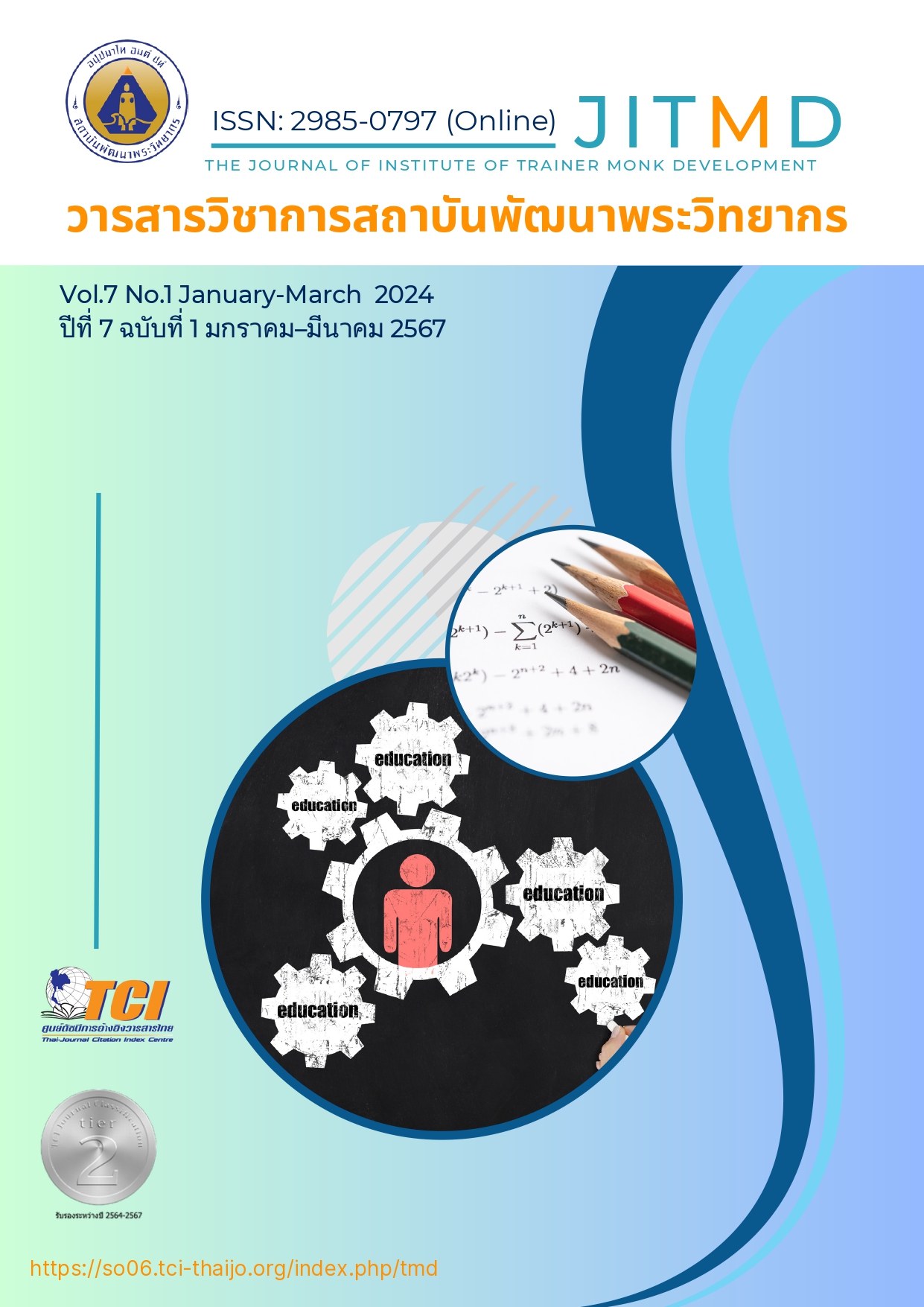Scenario of Competency-Based Curriculum Management in Sub-District Quality School Under the Ratchaburi Primary Educational Service Area Office 2 in the Disruption Era
Main Article Content
Abstract
This research aimed to study the scenario of competency-based curriculum management for sub-district quality schools under the Ratchaburi Primary Educational Service Area Office 2 in the disruption era. The research methodology employed was Ethnographic Delphi Future Research (EDFR). The research result was as follows: 1) school curriculum management that focuses on planning, preparation, and implementation of curriculum development, as well as the systematic appointment of a board of school curriculum administration; 2) curriculum development that prioritizes the construction of knowledge and understanding in competency-based curriculum development for both teachers and educational personnel. It also involves curriculum improvement in response to learners’ needs and school contexts, appropriate curriculum implementation, and the application of the results for continuous curriculum improvement; 3) competency-based curriculum that focuses on holistic learning and orients to skills and practice; 4) the importance of a competency-based curriculum that concentrates on learners’ interest, aptitude, ability, and needs and enhances knowledge exchange and learners’ practical experience as a key to improving learner quality in order to meet universal standards and enable them to adapt and update themselves to technology and a rapidly changing world; 5) the competency-based assessment that emphasizes determining methods for assessing core competencies, integrates related competencies, and specifies learning assessment as part of the teaching process; 6) the competency-based curriculum management that emphasizes curriculum development through the analysis and understanding of the curriculum, informs curriculum users about the goals, principles, structure, learning management outlines, and clear measurement and evaluation in accordance with the curriculum, and prepares learners for job competition and the changes in the global society; and 7) the guidelines for competency-based curriculum management in the disruption era that focuses on preparing educational agencies with a guideline and handbook for competency-based curriculum management to promote effective administration in educational institutions.
Article Details

This work is licensed under a Creative Commons Attribution-NonCommercial-NoDerivatives 4.0 International License.
บทความที่ได้รับการตีพิมพ์เป็นลิขสิทธิ์ของวารสารวิชาการสถาบันพัฒนาพระวิทยากร
ข้อความที่ปรากฎอยู่ในบทความที่ได้รับการตีพิมพ์ในวารสาร ถือเป็นความรับผิดชอบของผู้เขียนบทความ และข้อคิดเห็นนั้นไม่ถือว่าเป็นทัศนะและความรับผิดชอบของกองบรรณาธิการวารสารวิชาการสถาบันพัฒนาพระวิทยากร
References
กษมา ชนะวงศ์. (2564). รูปแบบการบริหารจัดการหลักสูตรสถานศึกษาเพื่อส่งเสริมคุณลักษณะในศตวรรษที่ 21 ของนักเรียนโรงเรียนเอกชน. วิทยานิพนธ์ศึกษาศาสตรดุษฎีบัณฑิต สาขาวิชาการบริหารการศึกษา. บัณฑิตวิทยาลัย มหาวิทยาลัยนเรศวร.
คณะกรรมการอิสระเพื่อการปฏิรูปการศึกษา. (2562). รายงานเฉพาะเรื่องที่ 12 หลักสูตรและการเรียนการ สอนฐานสมรรถนะ. กรุงเทพฯ: สำนักงานเลขาธิการ คณะกรรมการอิสระเพื่อการปฏิรูปการศึกษา.
นริศรา มากมีและ ธีรศักดิ์ อุปไมยอธิชัย. (2565). การเตรียมการบริหารหลักสูตรสถานศึกษาฐานสมรรถนะของโรงเรียนขยายโอกาสทางการศึกษา สังกัดสำนักงานเขตพื้นที่การศึกษาประถมศึกษาพิจิตร เขต 1. วิทยานิพนธ์ศึกษาศาสตรบัณฑิต สาขาวิชาการบริหารการศึกษา. บัณฑิตวิทยาลัย มหาวิทยาลัยนเรศวร.
พฤทธิ์ ศิริบรรณพิทักษ์. (2561). กระบวนทัศน์ใหม่ของการบริหารการศึกษา. สืบค้นข้อมูลเมื่อวันที่ 4มีนาคม 2566 จาก https://www.sammajivasil.net/news11.htm.
มนสิช สิทธิสมบูรณ์. (2563). การพัฒนาหลักสูตรมโนทัศน์และการประยุกต์ใช้. (พิมพ์ครั้งที่ 2). พระนครศรีอยุธยา: โรงพิมพ์มหาจุฬาลงกรณราชวิทยาลัย.
สำนักงานเลขาธิการสภาการศึกษา. (2562). รายงานผลการวิจัยและพัฒนากรอบสมรรถนะผู้เรียนระดับประถมศึกษาตอนต้น สำหรับหลักสูตรการศึกษาขั้นพื้นฐาน. กรุงเทพฯ: สกศ.


